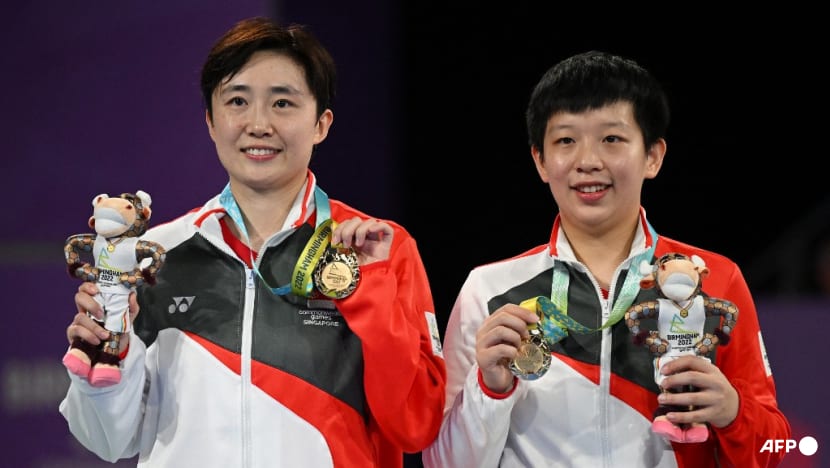Commentary: Singapore's decision to forgo the 2026 Commonwealth Games bid was smart
The hosting of a major sports event cannot be a vanity project, says Eugene Tan, who was team manager of Singapore's 2004 Athens Olympics national swim team.

A view of the fireworks during the closing ceremony of the Commonwealth Games in Birmingham on Aug 8, 2022. (File photo: Reuters)

This audio is generated by an AI tool.
SINGAPORE: I must admit to being relieved when Commonwealth Games Singapore (CGS) and Sport Singapore (SportSG) announced on Apr 3 that they had decided against making a bid to host the next edition of the Commonwealth Games in 2026. No reasons were given for the decision.
Earlier, in March, CGS and SportSG had confirmed that Singapore was “assessing the feasibility” of an invitation from the Commonwealth Games Federation (CGF) to stage the quadrennial event.
Multi-sport events like the Commonwealth Games rarely do as well as single-sport marquee events like the Rugby Sevens and the Formula 1 night race.
Moreover, the Commonwealth Games is in search of relevance, unlike the Asian Games and the Olympic Games. Until its relevance is clear, hosting the Commonwealth Games is a “poisoned chalice” that I thought we would do well to not be the proverbial fools rushing in where angels fear to tread. Admittedly, I was concerned about hubris that Singapore could be the go-to destination.
In December 2023, the Singapore Sports Hub marked the first full year of its handover from the private consortium that had been running the facility since 2014 to the government. It announced a 30 per cent increase in sports, entertainment and lifestyle event days compared to 2019.
Kallang Alive Sport Management (KASM), the corporate entity established by the Ministry of Culture, Community and Youth and SportSG to manage the S$1.33 billion facility (US$977 million), hailed the “strong pipeline” of events in 2023 as a key factor to this growth.
Such events included sold-out concerts by international artistes such as K-pop group Blackpink and Hong Kong singer-actor Jacky Cheung. In fact, the “God of Songs” Cheung set a record for the most shows by an artiste in a single leg of a concert tour in Singapore - 11 in total.
KASM expects to draw close to 1 million visitors this year, helped in no small part by a star-studded list of artistes including Coldplay, Ed Sheeran and Taylor Swift, as well as sports and family entertainment events such as the Singapore Smash table tennis tournament, Disney on Ice, the FIBA 3x3 Asia Cup and the HSBC Rugby Sevens.
So even as Singapore seeks to broaden and enrich the Sports Hub programming, we have to be highly selective and not seek vanity projects. The Sports Hub's success should not be at the expense of a disciplined public coffer and prudent public spending as sponsorship monies will be grossly inadequate.
AN EVENT IN SEARCH OF RELEVANCE
Increasingly derided as “a relic of Britain’s imperial past”, the Commonwealth Games struggles to find its relevance in an ever-packed sporting calendar.
Although the demise of the event has been suggested for nearly half a century now, it has somehow managed to defy its critics. It now faces the immense challenge of finding a host city for the 2026 edition. Just last week, it was reported that Glasgow, which hosted the Games in 2014, could be the host city of last resort but for a scaled-down version of the Games.
The Australian state of Victoria, the original host, had in July 2023 pulled out due to escalating costs. The budget had reportedly ballooned to A$7 billion (US$4.5 billion) from the original estimate of A$2.6 billion.
With Malaysia and Singapore declining to make a bid to host the Games, its survival hinges on whether it can create a niche and evolve accordingly such that prospective host cities will find the event financially viable.
With public coffers around the world facing ever-stiffer demands to meet expanding needs and wants, it should come as no surprise that major sporting events are no longer as attractive as they used to be. Even the Olympic Games, the pinnacle of sporting excellence, has a checkered record of host cities being saddled with debts for decades.
LISTEN: Should Singapore host the 2026 Commonwealth Games?
MAJOR GAMES NO LONGER A SURE ECONOMIC WINNER
Take the upcoming Summer Olympic Games for example. Initially, Budapest, Los Angeles, Paris, Rome and Hamburg were the five host city finalists. However, Budapest, Rome and Hamburg eventually withdrew due to a lack of political will and national unity, leaving only Los Angeles and Paris.
In an unprecedented move, the International Olympic Council in 2017 picked the 2024 and 2028 venues simultaneously, with Paris and Los Angeles taking turns hosting due to the lack of candidate cities.
The costs of hosting the Olympic Games have skyrocketed, especially when huge investments are needed for public and sporting infrastructure. Compounding the challenges is the uncertain economic benefits for host cities. The days of striking a lottery as a host city are probably long gone.
Even when a host city wins accolades for a successful Olympic Games, there is also the issue of post-Games white elephants. These are the purpose-built sporting facilities that must meet exacting world-class standards so that they are fit for world-record performances. But these attributes, unfortunately, have limited post-Games use, because of their size or specialised nature. They also impose significant maintenance costs for years to come - the proverbial albatross around the neck of a host city.
Almost all the facilities specially built for the 2004 Athens Olympics are now derelict. Furthermore, there are the implicit costs to consider, such as the opportunity costs of public spending that could have been spent on other priorities.
Servicing the debt that is left over after hosting a major sports event can burden public budgets for decades. For example, Montreal took three decades to pay off the debt incurred from hosting the 1976 Olympic Games, while Greece’s Olympics debt contributed to the infamous Greek debt and political crisis several years later.
To be sure, even if Singapore were to host the 2026 Commonwealth Games, our fiscal discipline would go some way in ensuring that we would not incur a large public debt. However, any cost overruns would come with a heavy political price. It begs the question of why we should even get into such a situation in the first place.
Steps have been taken to remodel the Commonwealth Games but the search for its relevance remains its Achilles heel. The Games used to be seen as a useful sporting showcase for smaller nations and territories that struggle at the Olympics. But so far, it is still not seen as a compelling sporting event by athletes, sponsors, and countries.
Even for Singapore, the Asian Games (with 12,500 athletes in Hangzhou last year) is ranked higher in terms of overall prestige and competitiveness. An individual gold at the Commonwealth Games (about 5,000 athletes) earns the athlete S$40,000 under the Singapore National Olympic Council’s current Major Games Award incentive scheme. In contrast, an athlete pockets S$200,000 for an Asiad gold and S$1 million for an Olympic gold.

CAN SINGAPORE GO BEYOND HOSTING JUST THE SEA GAMES?
Singapore’s decision not to make a bid to host the 2026 Commonwealth Games is undoubtedly a right one. While our sporting infrastructure has improved in the last decade, significant expenditure would still have to be incurred to get them to be games-ready.
This does not mean that Singapore is destined to host only the SEA Games, which it did in 1973, 1983, 1993 and most recently in 2015. It will do so again in 2029.
But before we contemplate hosting major sporting events that will consume significant public resources with the returns uncertain, Singaporeans must buy into the decision. That, in turn, means that Singaporeans must be persuaded of its economic viability.
If countries with stronger sporting cultures and a comprehensive suite of sport facilities were not able to avoid going into a deficit when they hosted major Games, it needs to be asked, not once but many times, why Singapore being the host would be different.
Would the national pride generated from our athletes doing well and doing us proud before a home audience justify the hundreds of millions that will have to be spent on hosting the Games? The hosting of a major sports event cannot be a vanity project. It has to be hard-nosed realism or else the fiscal consequences will be an unnecessary legacy.
Eugene K B Tan is associate professor of law at the Singapore Management University. He was the team manager for water-polo and swimming at the Busan Asian Games (2002) and the Athens Olympics (2004) respectively.

















